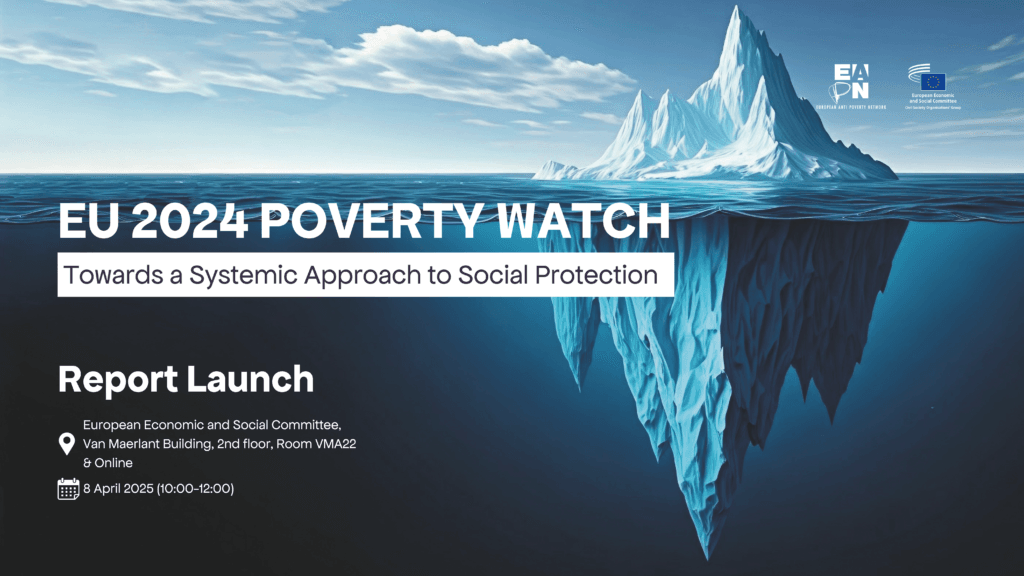
[Brussels, 4 April, 2025] – On 8 April, the European Anti-Poverty Network (EAPN) will launch its latest Poverty Watch Report, entitled “Towards a systemic approach to social protection”, at an event co-organised with the European Economic and Social Committee’s (EESC) Civil Society Organisations’ Group, in Brussels. The report addresses the challenges that need to be overcome to secure strong and resilient social protection systems, especially in the current context as EU welfare states face increasing financial constraints due to national spending limitations and increased defence and security expenditures.
The report, based on the findings from nineteen EAPN national member organisations, demonstrates that achieving a systemic approach to comprehensive and effective social protection requires policies embedded in integrated, long-term strategies, that coordinate economic, social, and environmental dimensions. These policies must be based on robust evidence, data, and the meaningful participation of people experiencing poverty.
EAPN’s national networks voice apprehension over the reduction in social expenditure. Additionally, indicators such as high levels of non-take up of social benefits continue to raise concerns about the efficiency of policies that fail to reach those in need and eligible for social benefits.
According to the report, the response to a fast-changing world, marked by digitalisation, war, an ageing population, and climate change, has been inadequate, highlighting the need to re-establish a systemic approach to social policies.
Juliana Wahlgren, EAPN’s Director, highlighted the urgency of the issue, stating:
“The EU needs to protect the welfare state and to prioritise the social spending. For that, the Poverty Watch Report has recommendations on the minimum income, housing crisis, energy transition, among others. Efficiency and adequacy are essential. Next year, the European Commission will launch the EU Anti-Poverty Strategy, but it can only succeed if Member States adopt a truly systemic approach to social protection. With more than 20% of the EU population at risk of poverty, we cannot afford to continue with fragmented policies – social protection must be strong, coordinated, and effective.”
Séamus Boland, President of the EESC Civil Society Organisations’ Group, said:
“The eradication of poverty requires unrelenting action by all Member States. Much of the poverty experienced in the EU is intergenerational and can be particularly harsh on the lives of children and older people. In the areas of education, housing and high-cost energy, special measures – that target the weaknesses of the system – must be introduced. Otherwise, the EU as a political entity will struggle to retain the confidence of its citizens”.
The launch of the report will take place at the European and Economic Social Committee, at the Van Maerlant Building, on 8 April from 10 am. The event will feature:
The launch of the report will take place at the European and Economic Social Committee, at the Van Maerlant Building, on 8 April from 10 am. The event will feature:
Séamus Boland, President of the Civil Society Organisations’ Group of the European Economic and Social Committee (EESC),
- Jiri Svarc, Head of Unit, Social Policies, Child Guarantee, SPC, DG Employment and Social Affairs of the European Commission
- Krzysztof Balon, EESC Rapporteur on the EU Anti-Poverty Strategy and Vice-President of the Civil Society Organisations’ Group
- Marie Toussaint, Greens/EFA Member of the European Parliament and co-chair of the Intergroup Fighting against Poverty
- Gunou Mahmoud, Person experiencing Poverty Representative, EAPN Netherlands
Media Access & Registration (open until 7 April, inclusive):
Journalists are welcome to attend the event. Interviews with speakers can be arranged upon request.
For media inquiries, interview requests, or accreditation, please contact:
EESC: jasmin.kloetzing@eesc.europa.eu
+32 2 546 90 67
EAPN: susana.anastacio@eapn.eu
+351 91 818 49 03
The European Anti-Poverty Network (EAPN) is the largest European network of national, regional and local networks, involving anti-poverty NGOs and grassroot groups as well as European Organisations, active in the fight against poverty and social exclusion. It was established in 1990.
The European Economic and Social Committee is an institutional consultative body established by the 1957 Treaty of Rome. It represents the various economic and social components of organised civil society. In line with the changes introduced in the Lisbon Treaty, its Civil Society Organisations’ Group is made up of “other representatives and stakeholders of civil society, particularly in the economic, civic, professional and cultural field”. The EESC’s consultative role enables its members, and hence the organisations they represent, to participate in the EU decision-making process.
